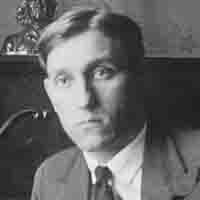Garovi Josef
(07. 03. 1908 - 17. 10. 1985)
Garovi Josef
Angelo Garovi
Dählhölzliweg 8
CH-3005 Bern (BE)
Schweiz
info@josefgarovi.ch
Tel: +41(0)31 352 98 52
www.josefgarovi.ch

Angelo Garovi
Dählhölzliweg 8
CH-3005 Bern (BE)
Schweiz
info@josefgarovi.ch
Tel: +41(0)31 352 98 52
www.josefgarovi.ch

Genre: Classical Music
Biography
* 07. 03. 1908, † 17. 10. 1985.
Josef Garovi was born in Sachseln (Obwalden) and died in Locarno. He was born into an old family of master builders and architects related to Francesco Borromini and Carlo Maderno.
He studied at the organ school in Lucerne (Franz Josef Breitenbach and Josef Breitenbach), at the Conservatoire de musique de Neuchâtel (Georges Humbert, Charles Faller), at the Acadamy of Composition in Munich (church music with cathedral chapel master Ludwig Berberich; composition with the Reger students Gottfried Rüdinger and Joseph Haas) and in Paris (organ and improvisation with Marcel Dupré and piano with Vlado Perlemuter). He also attended a course in composition held by Arthur Honegger.
From 1934 until 1956, Garovi was a music teacher at the Collegium Sarnen and teacher of organ play and theory at the organ school in Lucerne, where he became director in 1948 and held the position until 1956. From 1956 until 1972, he worked as a choral director, organist and music teacher in Valais, Lucerne and Zurich. He lived in Ticino from 1973 until 1985.
As a composer, he concentrated primarily on the writing of church music. There followed a period of occupation with twelve-tone music from 1950 until 1955, which he even partly incorporated into liturgical works. Following a phase of non-serial organ works and church music, he resumed the serial technique in 1966 and integrated it, for the most part, into demanding concertante works ('Inventiones für Streichorchester', 1969, with quarter tones). He reverted back to this tradition in his later compositions but in a more Postmodernist sense.
Josef Garovi received the 'Lasso-Medaille' awarded in 1977 in Lucerne by the 'Allgemeinen Cäcilienverband' for the German-speaking countries and the Inner Swiss Culture Prize in 1978.
Josef Garovi was born in Sachseln (Obwalden) and died in Locarno. He was born into an old family of master builders and architects related to Francesco Borromini and Carlo Maderno.
He studied at the organ school in Lucerne (Franz Josef Breitenbach and Josef Breitenbach), at the Conservatoire de musique de Neuchâtel (Georges Humbert, Charles Faller), at the Acadamy of Composition in Munich (church music with cathedral chapel master Ludwig Berberich; composition with the Reger students Gottfried Rüdinger and Joseph Haas) and in Paris (organ and improvisation with Marcel Dupré and piano with Vlado Perlemuter). He also attended a course in composition held by Arthur Honegger.
From 1934 until 1956, Garovi was a music teacher at the Collegium Sarnen and teacher of organ play and theory at the organ school in Lucerne, where he became director in 1948 and held the position until 1956. From 1956 until 1972, he worked as a choral director, organist and music teacher in Valais, Lucerne and Zurich. He lived in Ticino from 1973 until 1985.
As a composer, he concentrated primarily on the writing of church music. There followed a period of occupation with twelve-tone music from 1950 until 1955, which he even partly incorporated into liturgical works. Following a phase of non-serial organ works and church music, he resumed the serial technique in 1966 and integrated it, for the most part, into demanding concertante works ('Inventiones für Streichorchester', 1969, with quarter tones). He reverted back to this tradition in his later compositions but in a more Postmodernist sense.
Josef Garovi received the 'Lasso-Medaille' awarded in 1977 in Lucerne by the 'Allgemeinen Cäcilienverband' for the German-speaking countries and the Inner Swiss Culture Prize in 1978.
Work list
Am Strande des Sarnersees (1928)
Instrumentation: for band
Manuscript
Jubiläumsmarsch (1932)
Instrumentation: for band
Manuscript
Tui sunt Coeli (1932)
Instrumentation: for mixed, a-cappella choir
Manuscript
Orgelvorspiel zum Introitus "Puer natus est" (organ prelude to introitus "Puer natus est") (1932)
Manuscript
Trio (1932)
Instrumentation: for organ
Manuscript
Doppelfuge (double fugue) (1933)
Instrumentation: for organ
Manuscript
Toccata (1934)
Instrumentation: for organ
Manuscript
Friedensgebet an Bruder Klaus (1934)
Instrumentation: for mixed choir and orchestra
Texts: Ludwig von Moos
Manuscript
Festliches Praeludium (1934)
Greetings to Brother Klaus
Instrumentation: for band
Manuscript
Instrumentation: for band
Manuscript
Der Männer Treueschwur an Bruder Klaus (1934)
Instrumentation: for male choir
Texts: Plazidus Hartmann
Manuscript
Oratio B. Nicolai de Rupe (1934)
Instrumentation: for mixed choir, orchestr and organ
Manuscript
Toccata und Fuge (toccata and fugue) (1935)
Instrumentation: for organ
Manuscript
Trio (1935)
Instrumentation: for violin, violoncello and piano
Manuscript
Missa in honorem B. Nicolai de Flüe (1936)
Instrumentation: for mixed choir and organ
Manuscript
Jubilate (1936)
Instrumentation: for mixed choir and organ
Manuscript
Pièce héroique (1938)
Instrumentation: for large orchestra
Manuscript
Ave Maria (1940)
Instrumentation: for male choir and organ
Manuscript
Missa in honorem Nicolai de Flüe (1944)
Instrumentation: for mixed choir and organ
Edition Cron
Postludium über "Cantate Domino" (postlude over "Cantate Domino") (1946)
Instrumentation: for organ
Manuscript
Trio (1946)
Instrumentation: for organ
Manuscript
Missa festiva in honorem S. Nicolai de Flüe (1947)
Instrumentation: for mixed choir and organ
Maurice et Pierre Foetisch
5-7 rue de l'Ancien-Port
CH-1201 Genève
Suisse
Tel. +41 (0)22 738 91 10
Fax +41 (0)22 738 91 16
sidomusic@sidomusic.com
www.sidomusic.com
CH-1201 Genève
Suisse
Tel. +41 (0)22 738 91 10
Fax +41 (0)22 738 91 16
sidomusic@sidomusic.com
www.sidomusic.com
Domine fortitudo mea (1947)
Offertorium
Instrumentation: for mixed choir and organ
Instrumentation: for mixed choir and organ
Edition Cron
Fuge (fugue) (1948)
Instrumentation: for string quartet
Manuscript
Introduktion und Fuge (introduction and fugue) (1948)
Instrumentation: for organ
Manuscript
Pange lingua (1949)
Instrumentation: for mixed choir
Manuscript
Obwaldner Land (1949)
Instrumentation: for one or two part choir, a-cappella or with piano accompaniment
Hug & Co. Musikverlage
Limmatquai 28-30
CH-8001 Zürich
CH-8001 Zürich
Praeludium (prelude) (1949)
Instrumentation: for organ
Manuscript
Offertorium (1949)
Instrumentation: for organ
Manuscript
Gesang der Geister über den Wasser (1950)
Cantata
Instrumentation: for soprano and mixed choir
Texts: Johann Wolfgang von Goethe
Manuscript
Instrumentation: for soprano and mixed choir
Texts: Johann Wolfgang von Goethe
Manuscript
Drei Choralvorspiele (three choral preludes) (1950)
Instrumentation: for organ
Manuscript
Toccata nach einer Zwölftonreihe (toccato after a twelve-tone series) (1951)
Instrumentation: for organ
Manuscript
Inimicitias ponam (1952)
Offertorium
Instrumentation: for mixed choir and organ
Instrumentation: for mixed choir and organ
Edition Cron
Ave Maria (1952)
Instrumentation: for mixed choir and organ
Manuscript
Harmonie (1953)
March
Instrumentation: for band
Manuscript
Instrumentation: for band
Manuscript
Proprium ad Missam D.N.Jesu Christi Summi et Aeterni sacerdotis (1954)
Instrumentation: for mixed choir and organ
Edition Cron
Viderunt omnes (1955)
Gradual for Yuletide
Instrumentation: for mixed choir and organ
Instrumentation: for mixed choir and organ
Edition Cron
Introitus, Kyrie, Alleluja (1955)
Instrumentation: for mixed choir, string quartet and four woodwind instruments
Manuscript
Toccata e Fuga (toccata and fugue) (1957)
Instrumentation: for organ
Amadeus Verlag
Hermannstrasse 7
CH-8400 Winterthur
Schweiz
Tel. +41 (0)52 233 28 66
Fax +41 (0)52 233 54 01
www.amadeusmusic.ch
CH-8400 Winterthur
Schweiz
Tel. +41 (0)52 233 28 66
Fax +41 (0)52 233 54 01
www.amadeusmusic.ch
Partita über "Veni Creator Spiritus" (partita over "Veni Creator Spiritus") (1958)
Instrumentation: for organ
Amadeus Verlag
Hermannstrasse 7
CH-8400 Winterthur
Schweiz
Tel. +41 (0)52 233 28 66
Fax +41 (0)52 233 54 01
www.amadeusmusic.ch
CH-8400 Winterthur
Schweiz
Tel. +41 (0)52 233 28 66
Fax +41 (0)52 233 54 01
www.amadeusmusic.ch
Tui sunt caeli (1960)
Offeratorium for Advent
Instrumentation: for mixed a-cappella choir
Instrumentation: for mixed a-cappella choir
Edition Cron
Triptychon nach liturgischen Texten (triptych after liturgical texts) (1961)
Instrumentation: for mixed a-cappella choir
Manuscript
Psalm 66 (1962)
Instrumentation: for male choir and organ
Manuscript
Introduktion und Fuge über "Erschienen ist der herrlich Tag" (introduction and fugue over "Erschienen ist der herrlich Tag") (1968)
Instrumentation: for organ
Manuscript
Inventiones (1969)
Instrumentation: for string orchestra
Manuscript
Drei Sätze (three movements) (1971)
Instrumentation: for organ
Bote & Bock
Lützowufer 26
D-10787 Berlin
Deutschland
Tel. +49 30 2500130
Fax +49 30 25001399
musikverlag@boosey.com
www.boosey.com
D-10787 Berlin
Deutschland
Tel. +49 30 2500130
Fax +49 30 25001399
musikverlag@boosey.com
www.boosey.com
O min got und min her (1972)
Bruderklausengebet
Instrumentation: for mixed a-cappella choir
Instrumentation: for mixed a-cappella choir
Edition Cron
Cardada (1973)
March
Instrumentation: for band
Manuscript
Instrumentation: for band
Manuscript
Fantasie (fantasy) (1973)
Instrumentation: for clarinet and piano
Amadeus Verlag
Hermannstrasse 7
CH-8400 Winterthur
Schweiz
Tel. +41 (0)52 233 28 66
Fax +41 (0)52 233 54 01
www.amadeusmusic.ch
CH-8400 Winterthur
Schweiz
Tel. +41 (0)52 233 28 66
Fax +41 (0)52 233 54 01
www.amadeusmusic.ch
Andante über ein Thema von Arnold Schönberg (andante over a theme by Arnold Schönberg) (1974)
Instrumentation: for piano
Manuscript
Klavierstück (piano piece) (1975)
Manuscript
Capriccio (1977)
Instrumentation: for clarinet and chamber orchestra
Manuscript
Concerto (1979-1980)
Instrumentation: for organ and orchestra
Manuscript
Fantasie (fantasy) (1979)
Instrumentation: for flute
Manuscript
Stadt der Armen und Gebeugten (1981)
four hymns for Pentecost
Instrumentation: for cantor, mixed choir and organ
Manuscript
Instrumentation: for cantor, mixed choir and organ
Manuscript
Duo (1982)
Instrumentation: for flute and clarinet
Manuscript
Trio (1982)
Instrumentation: for flute, clarinet and bass clarinet
Manuscript
Klavierstück (piano piece) (1984)
Manuscript
Friedensheiliger, Bruder Klaus (1984)
Canon
Instrumentation: for choir (with wind instrumentalists)
Manuscript
Instrumentation: for choir (with wind instrumentalists)
Manuscript
Quartetto d'Archi (string quartet) (1985)
Manuscript
Discography
Musik in Luzern. Orgelmusik an der Hofkirche (GALLO Nr. CD-754, 1993)
Eisenmann, Will: Praeludium, op. 97 (1978)
Works:
Garovi, Josef: Partita über "Veni Creator Spiritus" (1958)Eisenmann, Will: Praeludium, op. 97 (1978)
Info: www.fonoteca.ch
Schweizer Orgelmusik. Olivier Eisenmann an der Berner Münsterorgel (VLEUGELS Nr. CD7628, 1993)
Works:
Garovi, Josef: Concerto (1979-1980)Info: www.fonoteca.ch
Musica Unterwaldensis - Obwaldner Blasmusik (MAGNON Nr. PN 4220 (CD3333), 1990)
Garovi, Josef: Cardada (1973)
Works:
Garovi, Josef: Harmonie (1953)Garovi, Josef: Cardada (1973)
Info: www.fonoteca.ch
Last updated: 2024-11-23 11:13:06